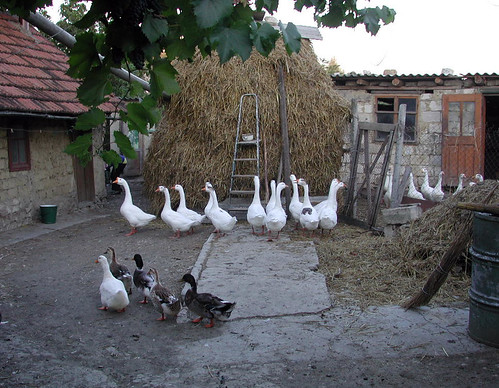August-September 2001 -- I did a Farmer-to-Farmer assignment with Citizens Network for Foreign Affairs (CNFA) in 2001 in Moldova. It was a solo assignment. I didn't know anyone before I got there. I taught farm financial management to farmers. I managed to get home a day or so before 9-11.
Moldova is one of the most interesting countries I have visited. It is an Eastern European country and former Soviet Republic. Moldova and Romania have a long and complicated relationship. They speak the same language, though I'm sure there are differences. Relatives were kept apart during the Soviet era.
Moldova was annexed by the USSR after WWII, while Romania remained under the sphere of Soviet influence. In 1991 when the Soviet Union dissolved, Moldova declared its independence. While Moldova has gradually transitioned to a market economy, its journey has been difficult, and it is the second poorest country in Europe. It is not a member of NATO or the EU, whereas Romania is.

Vineyards
In 2001, Moldova was 10 years into a market economy, and their economy was still struggling. It was proving difficult to dismantle the system of state and collective farms forced upon them by Soviet collectivization. Many farms lay idle. Production lost. Stores had goods, but no one to buy them. In the rural villages, there wasn't a lot of indoor plumbing. A visit to the countryside was like a visit back in time. Moldovans had just voted the Communists back into power. Who could blame them? Freedom doesn't mean much when you don't have food on the table.
During the week, we (myself and translator) stayed in the villages with a host family. After a few days, we'd return to the capitol. In Chișinău I could get a hot shower, use a toilet, and eat at a restaurant. But it was in the villages that I got to meet people and learn about their past and hopes for the future. I recall meeting a school teacher in one of the villages. He had one of the few houses with indoor plumbing. He related his experiences teaching. He told us about the difficulties trying to connect with relatives in Romania during the Soviet era. While walking around the village, I remember meeting a woman who was thankful to the US for rescuing her daughter from white slavery. It made me free proud. I was somewhat of a novelty when I walked around the village.

















No comments:
Post a Comment